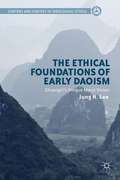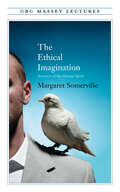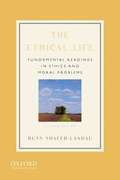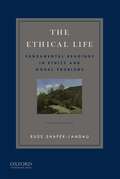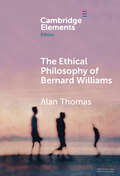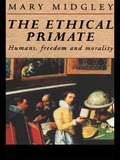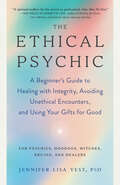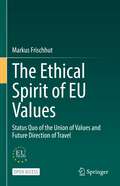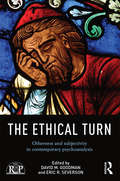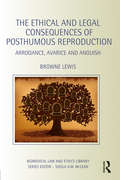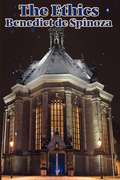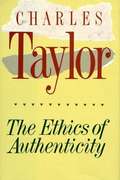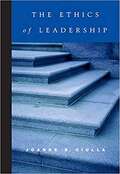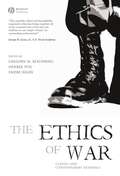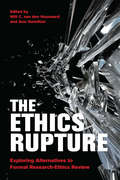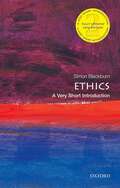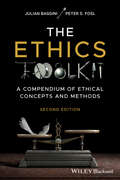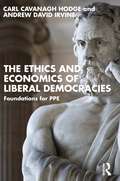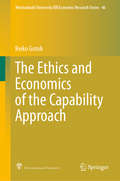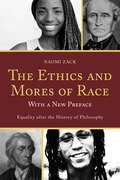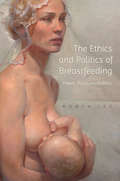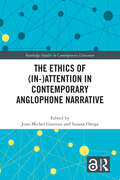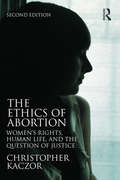- Table View
- List View
The Ethical Foundations of Early Daoism
by Jung H. LeeThe Ethical Foundations of Early Daoism: Zhuangzi's Unique Moral Vision argues that we can read early Daoist texts as works of moral philosophy that speak to perennial concerns about the well-lived life in the context of the Way. Lee argues that we can interpret early Daoism as an ethics of attunement.
The Ethical Imagination: Journeys of the Human Spirit (The CBC Massey Lectures)
by Margaret SomervilleScience and technology force us to ask some of the most challenging and unprecedented ethical questions in the world today. These issues encompass what it means to be human, how we relate to others and our world, and how we find meaning in life. How we can find a shared ethics for an interdependent world? In her 2006 CBC Massey Lectures, ethicist and McGill University professor Margaret Somerville tackles some of the most contentious issues of our times, and proposes a brilliant new kind of ethical language and thought to help us navigate them.
The Ethical Life (2nd Edition)
by Russ Shafer-LandauA Compact Yet Thorough collection of readings in ethical theory and contemporary moral problems-at the best price
The Ethical Life (Fourth Edition): Fundamental Readings In Ethics And Contemporary Moral Problems
by Russ Shafer-LandauBrief yet thorough and affordably priced, The Ethical Life: Fundamental Readings in Ethics and Moral Problems, Fourth Edition, is ideal for courses in introductory ethics and contemporary moral problems. Featuring forty-two readings divided into four parts--The Good Life, Normative Ethics, Metaethics, and Moral Problems--it introduces students to ethical theory and a wide range of moral issues. The essays include selections from such historically influential philosophers as Aristotle, Hume, Kant, and Mill alongside work by contemporary philosophers like Philippa Foot, Robert Nozick, Peter Singer, and Judith Jarvis Thomson. Detailed reading introductions provide helpful contextual information. Designed as a companion reader to Russ Shafer-Landau's textbook, The Fundamentals of Ethics, Fourth Edition, this volume is also comprehensive enough to be used on its own.
The Ethical Philosophy of Bernard Williams (Elements in Ethics)
by Alan ThomasThis Element surveys the main claims of Bernard Williams's ethical philosophy. Topics include ethical scepticism, virtue, reasons for action, the critique of the Morality System, moral realism and the nature of theorising in ethics.
The Ethical Primate: Humans, Freedom and Morality
by Mary MidgleyIn The Ethical Primate, Mary Midgley, 'one of the sharpest critical pens in the West' according to the Times Literary Supplement, addresses the fundamental question of human freedom. Scientists and philosophers have found it difficult to understand how each human-being can be a living part of the natural world and still be free. Midgley explores their responses to this seeming paradox and argues that our evolutionary origin explains both why and how human freedom and morality have come about.
The Ethical Project
by Philip KitcherPrinciples of right and wrong guide the lives of almost all human beings, but we often see them as external to ourselves, outside our own control. In a revolutionary approach to the problems of moral philosophy, Philip Kitcher makes a provocative proposal: Instead of conceiving ethical commands as divine revelations or as the discoveries of brilliant thinkers, we should see our ethical practices as evolving over tens of thousands of years, as members of our species have worked out how to live together and prosper. Elaborating this radical new vision, Kitcher shows how the limited altruistic tendencies of our ancestors enabled a fragile social life, how our forebears learned to regulate their interactions with one another, and how human societies eventually grew into forms of previously unimaginable complexity. The most successful of the many millennia-old experiments in how to live, he contends, survive in our values today. Drawing on natural science, social science, and philosophy to develop an approach he calls "pragmatic naturalism," Kitcher reveals the power of an evolving ethics built around a few core principles-including justice and cooperation-but leaving room for a diversity of communities and modes of self-expression. Ethics emerges as a beautifully human phenomenon-permanently unfinished, collectively refined and distorted generation by generation. Our human values, Kitcher shows, can be understood not as a final system but as a project-the ethical project-in which our species has engaged for most of its history, and which has been central to who we are.
The Ethical Psychic: A Beginner's Guide to Healing with Integrity, Avoiding Unethical Encounters, and Using Your Gifts for Good
by Jennifer Lisa VestA 101 guide for psychics and energy workers to build an authentic, equitable, and culturally sensitive healing practice, written by Afro-Indigenous intuitive, scholar, and healer Dr. Jennifer Lisa Vest.Being an ethical psychic means being of service--and learning how to navigate the thorny issues and unique risks inherent to intuitive work. From knowing your boundaries and limitations--and respecting those of your clients--to resisting the temptation of the guru lifestyle, The Ethical Psychic offers 7 critical guiding principles for grounded, ethical practice. Intuitive, philosopher, and ethicist Dr. Jennifer Lisa Vest, PhD, explores why (and how) energy workers must be of service, authentic, and self-aware; learn from their mistakes; embody sensitivity to client needs; be humble; and listen to a higher source. With training in African American Hoodoo, Native American Sweatlodge, Jamaican Revivalism, Trinidadian Shango, Spiritualism, Reiki, Pranic Healing, and other traditions, Dr. Vest is uniquely positioned to address readers&’ most common and pressing questions, like: How do I avoid crossing boundaries? What if I&’m making things worse? What privacy considerations do I need to think about? How can I be financially ethical? How do I avoid appropriation? What do I need to know about working with spirits? A go-to-guide for any medium, spirit worker, psychic, or aspiring Reiki master, The Ethical Psychic helps readers become the grounded and effective healers they were born to be.
The Ethical Spirit of EU Values: Status Quo of the Union of Values and Future Direction of Travel
by Markus FrischhutThis open access book, summarising the research conducted at this Jean Monnet Chair, seeks to identify the ethical spirit of European Union (EU) values. EU integration began at the economic level; human rights were only added at a later stage. Finally, the Lisbon Treaty turned the EU into a ‘Union of values’ by enshrining certain concepts in Art 2 TEU. This provision can be seen as a hub linked to various other provisions of EU primary and secondary law. The values contained therein have, amongst others, been applied to two areas (digitalisation and non-financial reporting, partly in sports), and further specified in others (health and partly in sports). This book analyses the evolution of values (ratione temporis) and the questions of who is entitled and who is obliged (ratione personae). Besides the external perspective (ratione limitis; e.g., Brexit), it focuses on the composition of the EU’s common values (ratione materiae). As Art 2 TEU can be viewed as a hub, it is essential to focus on various relations, not only between values, but also between values and other provisions of EU law, as well as other concepts. Based on this description of the status quo, the book subsequently addresses a possible future direction, arguing for an additional narrative (trust), an additional value (environmental protection), and a more communitarian Union. In closing, apart from the classical commitment of the EU and the Member States to uphold the values of the EU, the book discusses the level of individuals and values as virtues. Various figures and tables complement this overview of the status quo of the Union of values and outline of its future direction.
The Ethical Turn: Otherness and Subjectivity in Contemporary Psychoanalysis (Relational Perspectives Book Series)
by Eric R. Severson David M. GoodmanLevinas (1969) claims that "morality is not a branch of philosophy, but first philosophy" and if he is right about this, might ethics also serve as a first psychology? This possibility is explored by the authors in this volume who seek to bring the "ethical turn" into the world of psychoanalysis. This phenomenologically rich and socially conscious ethics has taken centre stage in a variety of academic disciplines, inspired by the work of philosophers and theologians concerned with the moral fabric of subjectivity, human relationship, and socio-political life. At the heart of this movement is a reconsideration of the other person, and the dangers created when the question of the "Other" is subsumed by grander themes. The authors showcased here represent the exceptional work being done by both scholars and practitioners working at the crossroads between psychology and philosophy in order to rethink the foundations of their disciplines. The Ethical Turn: Otherness and subjectivity in contemporary psychoanalysis guides readers into the heart of this fresh and exciting movement and includes contributions from many leading thinkers, who provide fascinating new avenues for enriching our responses to suffering and understandings of human identity. It will be of use to psychoanalysts, professionals in psychology, postgraduate students, professors and other academics in the field.
The Ethical and Legal Consequences of Posthumous Reproduction: Arrogance, Avarice and Anguish (Biomedical Law and Ethics Library)
by Browne LewisPosthumous reproduction refers to the procedure that enables a child to be conceived using the gametes of a dead person. Advances in reproductive technology mean it is now possible to assist in creating a life after you die, and in recent years the number of women who have attempted to get pregnant using posthumous reproduction has increased. However, the law in many jurisdictions has not put regulations in place to deal with the ethical and legal consequences that arise as a result of posthumous reproduction. This is the first book to exclusively focus on posthumous reproduction. The book comprehensively explores the legal and ethical issues surrounding posthumous reproduction in a number of jurisdictions including the US, Israel, the UK and France. The book looks at a number of issues including: ascertaining the wishes of the dead and protecting the reproductive rights of men who have deposited frozen sperm in clinics prior to their deaths; cases involving people who want to acquire fresh sperm from deceased or incompetent men and determining who should have the right to accept the sperm; identifying the parents of the posthumously conceived child; and discussing the need to promote the best interests of the child. The book critically examines the current laws that are in place and proposes additional regulations and policies in order to effectively regulate posthumous reproduction.
The Ethics
by Benedict De SpinozaBenedict de Spinoza's writings laid the groundwork for the 18th century Enlightenment and for modern Biblical criticism. By virtue of his magnum opus, The Ethics, Spinoza is considered one of Western philosophy's definitive ethicists.
The Ethics Of Authenticity
by Charles TaylorEverywhere we hear talk of decline, of a world that was better once, maybe fifty years ago, maybe centuries ago, but certainly before modernity drew us along its dubious path. While some lament the slide of Western culture into relativism and nihilism and others celebrate the trend as a liberating sort of progress, Charles Taylor calls on us to face the moral and political crises of our time, and to make the most of modernity's challenges. <p><p> At the heart of the modern malaise, according to most accounts, is the notion of authenticity, of self-fulfillment, which seems to render ineffective the whole tradition of common values and social commitment. Though Taylor recognizes the dangers associated with modernity's drive toward self realization, he is not as quick as others to dismiss it. He calls for a freeze on cultural pessimism. <p> In a discussion of ideas and ideologies from Friedrich Nietzsche to Gail Sheehy, from Allan Bloom to Michel Foucault, Taylor sorts out the good from the harmful in the modern cultivation of an authentic self. He sets forth the entire network of thought and morals that link our quest for self-creation with our impulse toward self-fashioning, and shows how such efforts must be conducted against an existing set of rules, or a gridwork of moral measurement. Seen against this network, our modern preoccupations with expression, rights, and the subjectivity of human thought reveal themselves as assets, not liabilities. <p> By looking past simplistic, one-sided judgments of modern culture, by distinguishing the good and valuable from the socially and politically perilous, Taylor articulates the promise of our age. His bracing and provocative book gives voice to the challenge of modernity, and calls on all of us to answer it.
The Ethics Of Leadership
by Joanne B. CiullaThe focus of ETHICS OF LEADERSHIP is the ethical challenges that are distinctive to leaders and leadership. Organized around themes such as power and the public and private morality of leaders, the book explores the ethical issues of leadership in a variety of contexts including, business, NGOs, and government. It integrates material on ethics and leadership from the great Eastern and Western philosophers with leadership literature and case studies. This multi-disciplinary approach helps philosophers and leadership scholars present a fully integrated view of the subject.
The Ethics Of War: Classic And Contemporary Readings
by Henrik Syse Gregory Reichberg Endre BegbyThe Ethics of War is an indispensable collection of essays addressing issues both timely and age-old about the nature and ethics of war. Features essays by great thinkers from ancient times through to the present day, among them Plato, Augustine, Aquinas, Machiavelli, Grotius, Kant, Russell, and Walzer Examines timely questions such as: When is recourse to arms morally justifiable? What moral constraints should apply to military conduct? How can a lasting peace be achieved? Will appeal to a broad range of readers interested in morality and ethics in war time Includes informative introductions and helpful marginal notes by editors
The Ethics Rupture: Exploring Alternatives to Formal Research-Ethics Review
by Ann Hamilton Will C. van den HoonaardFor decades now, researchers in the social sciences and humanities have been expressing a deep dissatisfaction with the process of research-ethics review in academia. Continuing the ongoing critique of ethics review begun in Will C. van den Hoonaard's Walking the Tightrope and The Seduction of Ethics, The Ethics Rupture offers both an account of the system's failings and a series of proposals on how to ensure that social research is ethical, rather than merely compliant with institutional requirements.Containing twenty-five essays written by leading experts from around the world in various disciplines, The Ethics Rupture is a landmark study of the problems caused by our current research-ethics system and the ways in which scholars are seeking solutions.
The Ethics Toolkit: A Compendium Of Ethical Concepts And Methods
by Julian Baggini Peter S. FoslThe Ethics Toolkit provides an accessible and engaging compendium of concepts, theories, and strategies that encourage students and advanced readers to think critically about ethics so that they can engage intelligently in ethical study, thought, and debate. Written by the authors of the popular The Philosophers' Toolkit (Blackwell, 2001); Baggini is also a renowned print and broadcast journalist, and a prolific author of popular philosophy books Uses clear and accessible language appropriate for use both inside and beyond the classroom Enlivened through the use of real-world and hypothetical examples Cross-referencing of entries helps to connect and contrast ideas Features lists of prominent ethics organizations and useful websites Encourages readers to think critically about ethics and teaches them how to engage intelligently in ethical study, thought, and debate
The Ethics Toolkit: A Compendium of Ethical Concepts and Methods
by Julian Baggini Peter S. FoslA new edition of the bestselling guide which equips readers with the skills necessary for engaging in ethical reflection The Ethics Toolkit offers an engaging and approachable introduction to the core concepts, principles, and methods of contemporary ethics. Explaining to students and general readers how to think critically about ethics and actually use philosophical concepts, this innovative volume provides the tools and knowledge required to engage intelligently in ethical study, deliberation, and debate. Invaluable as both a complete guide and a handy reference, this versatile resource provides clear and authoritative information on a diverse range of topics, from fundamental concepts and major ethical frameworks to contemporary critiques and ongoing debates. Throughout the text, Fosl and Baggini highlight the crucial role ethics plays in our lives, exploring autonomy, free will, consciousness, fairness, responsibility, consent, intersectionality, sex and gender, and much more. Substantially revised and expanded, the second edition of The Ethics Toolkit contains a wealth of new entries, new recommended readings, more detailed textual references, and numerous timely real-world and hypothetical examples. Uses clear and accessible language appropriate for use inside and beyond the classroom Contains cross-referenced entries to help readers connect and contrast ideas Engages both non-Western and Western philosophy Offer insights into key issues in ethics with a firm grounding in the history of philosophy Includes an appendix of tools for the practice of ethics, including links to podcasts, web and print resources, and prominent ethics organizations Written by the authors of the popular The Philosophers’ Toolkit, this new edition of The Ethics Toolkit is a must-have resource for anyone interested in ethics, from general readers to undergraduate and graduate students.
The Ethics and Economics of Agrifood Competition
by Harvey S. James Jr.This edited volume presents ethical and economic analyses of agrifood competition. By systematically examining fairness and openness in agricultural markets, it seeks to answer the question of whether there is adequate competition in the agrifood industry and whether the system is fair to all participants. It outlines ethical and economic principles important for understanding agrifood competition, presents arguments for and against consolidation, globalization and the integration of agrifood industries, and looks at the implications of globalization on the nature of competition in specific agricultural contexts.
The Ethics and Economics of Liberal Democracies: Foundations for PPE
by Andrew David Irvine Carl Cavanagh HodgeRarely in the short history of liberal-democratic government has a primer on basic liberal-democratic values and institutions been more needed than now. Popular discontent, even anger, with democratic governments has grown steadily over the past twenty years. Not since the 1930s have citizens and their elected officials been so baffled about their respective roles in the maintenance of both democratic governments and liberal economies. This book attempts to address this growing need. Especially written as a primer for courses in Philosophy, Politics and Economics (PPE), it has introductory chapters on all three main disciplines. It also has chapters on the rule of law and on three important public-policy areas – Corruption, Climate and Civil Society. Individual topics discussed include free and fair elections, populism, responsible government, republican and Westminster systems of government, regulated free markets, the Great Recession of 2008, globalization, greenwashing, identity politics, academic freedom, utilitarianism, social contract theory, positive and negative liberty, and the good life.Historically informed, The Ethics and Economics of Liberal Democracies: Foundations for PPE is sure to be of interest to students who are interested in public-policy work, as well as those who are interested in both the theory and practice of democratic government.Key Features: Written especially for PPE (Philosophy, Politics and Economics) courses and students Focuses on the key values and institutions of modern democracies Includes chapters on both the theory and practice of democratic government and public-policy work Provides a comprehensive glossary of relevant terms from all three disciplines
The Ethics and Economics of the Capability Approach (Hitotsubashi University IER Economic Research Series #46)
by Reiko GotohThis book inquires into the Capability Approach, a value theory of freedom, which crystalizes the interests of Marx, Welfare Economics, Social Choice, and Ethics. The capability approach has attracted many people as a promising interdisciplinary approach to human well-being and social worlds, finely overarching ethical and economic concerns. It has well challenged essential characteristics of welfare economics, which focuses on the criterion of efficiency with the concept of utility, by explicitly incorporating normative criteria such as agency, well-being and real freedom into positive analysis. However, it has a bit operational and methodological difficulties such that how to estimate an individual capability set which includes potential multi-dimensional functioning vectors. This book reminds the reader of what traditional economics has left behind, by examining historical backgrounds, scrutinizing philosophical foundations and providing an operational formulation of the capability approach: indispensable for understanding what the capability approach is about and what it can achieve.
The Ethics and Mores of Race: Equality after the History of Philosophy
by Naomi Zack<p>Preeminent philosopher, Naomi Zack, brings us an indispensable work in the ethics of race through an inquiry into the history of moral philosophy. Beginning with Plato and a philosophical tradition that has largely ignored race, The Ethics and Mores of Race: Equality after the History of Philosophy enters into a web of ideas, ethics, and morals that untangle our evolving ideas of racial equality straight into the twenty-first century. The dichotomy between ethics and mores has long aided the separation of what is right with ideas of equality. Zack tackles the co-existence of slavery with the classic moral systems and continues to show how our society has evolved and our mores with it. An ethics of race may not exist yet, but this book gives us twelve discerning requirements to establish it. <p>In the preface to the paperback edition, Zack addresses the criticisms raised in response to this book and concludes that a focus on rights and justice, rather than privilege, is the only fruitful pathway towards a functioning ethics of race. </p>
The Ethics and Politics of Breastfeeding: Power, Pleasure, Poetics
by Robyn LeeResponding to the most widely read breastfeeding manual, La Leche League’s The Womanly Art of Breastfeeding, Robyn Lee’s The Ethics and Politics of Breastfeeding explores breastfeeding as an art that must be developed through skillful application of effort and distinguished from a merely natural or physiological process. The Ethics and Politics of Breastfeeding challenges the dominant understanding of breastfeeding and cultivates an alternative conception as an ethical, embodied practice of the self. Drawing on the work of Michel Foucault, Emmanuel Levinas, and Luce Irigaray, Lee develops a new understanding of breastfeeding as an "art of living," where the practice is reconsidered in the light of ongoing social inequalities.
The Ethics of (Routledge Studies in Contemporary Literature)
by Susana Onega Jean-Michel GanteauThis volume argues that contemporary narratives evince a great deal of resilience by promoting an ecology of attention based on poetic options that develop an ethics of the particularist type. The contributors draw on critical and theoretical literature hailing from various fields: including psychology and sociology, but more prominently phenomenology, political philosophy, analytical philosophy (essentially Ordinary Language Philosophy), alongside the Ethics of Care and Vulnerability. This volume is designed as an innovative contribution to the nascent field of the study of attention in literary criticism, an area that is full of potential. Its scope is wide, as it embraces a great deal of the Anglophone world, with Britain, Ireland, the USA, but also Australia and even Malta. Its chapters focus on well-established authors, like Kazuo Ishiguro (whose work is revisited here in a completely new light) or more confidential ones like Melissa Harrison or Sarah Moss.Chapter 2 of this book is freely available as a downloadable Open Access PDF at http://www.taylorfrancis.com under a Creative Commons [Attribution-Non Commercial-No Derivatives (CC-BY-NC-ND)] 4.0 license.
The Ethics of Abortion: Women’s Rights, Human Life, and the Question of Justice (Routledge Annals of Bioethics)
by Christopher KaczorAppealing to reason rather than religious belief, this book is the most comprehensive case against the choice of abortion yet published. This Second Edition of The Ethics of Abortion critically evaluates all the major grounds for denying fetal personhood, including the views of those who defend not only abortion but also post-birth abortion. It also provides several (non-theological) justifications for the conclusion that all human beings, including those in utero, should be respected as persons. This book also critiques the view that abortion is not wrong even if the human fetus is a person. The Ethics of Abortion examines hard cases for those who are prolife, such as abortion in cases of rape or in order to save the mother’s life, as well as hard cases for defenders of abortion, such as sex selection abortion and the rationale for being "personally opposed" but publically supportive of abortion. It concludes with a discussion of whether artificial wombs might end the abortion debate. Answering the arguments of defenders of abortion, this book provides reasoned justification for the view that all intentional abortions are ethically wrong and that doctors and nurses who object to abortion should not be forced to act against their consciences. Updates and Revisions to the Second Edition include: -A response to Alberto Giubilini’s and Francesca Minerva’s now famous 2012 article, "After-Birth Abortion" in the Journal of Medical Ethics -Responses to new defenses of Judith Jarvis Thomson’s violinist argument -The addition of a new chapter on gradualist views of fetal moral worth, including Jeff McMahan’s Time-Relative Interest Account -The addition of a new chapter on the conscience protection for health care workers who are opposed to abortion -Responses to many critiques of the first edition, including those made by Donald Marquis, David DeGrazia, and William E. May
